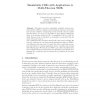Free Online Productivity Tools
i2Speak
i2Symbol
i2OCR
iTex2Img
iWeb2Print
iWeb2Shot
i2Type
iPdf2Split
iPdf2Merge
i2Bopomofo
i2Arabic
i2Style
i2Image
i2PDF
iLatex2Rtf
Sci2ools
117
Voted
CRYPTO
2007
Springer
2007
Springer
Simulatable VRFs with Applications to Multi-theorem NIZK
Abstract. This paper introduces simulatable verifiable random functions (sVRF). VRFs are similar to pseudorandom functions, except that they are also verifiable: corresponding to each seed SK, there is a public key PK, and for y = FPK (x), it is possible to prove that y is indeed the value of the function seeded by SK. A simulatable VRF is a VRF for which this proof can be simulated, so a simulator can pretend that the value of FPK (x) is any y. Our contributions are as follows. We introduce the notion of sVRF. We give two constructions: one from general assumptions (based on NIZK), but inefficient, just as a proof of concept; the other construction is practical and based on a special assumption about composite-order groups with bilinear maps. We then use an sVRF to get a direct transformation from a single-theorem non-interactive zero-knowledge proof system for a language L to a multi-theorem non-interactive proof system for the same language L.
| Added | 07 Jun 2010 |
| Updated | 07 Jun 2010 |
| Type | Conference |
| Year | 2007 |
| Where | CRYPTO |
| Authors | Melissa Chase, Anna Lysyanskaya |
Comments (0)

